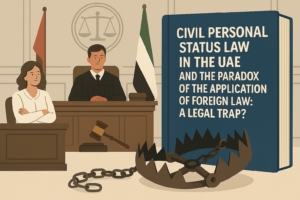Civil Personal Status Law in the UAE and the Paradox of the Application of Foreign Law: A Legal Trap?

I. Introduction (*)
(*) For the sake of simplicity, reference will be made only to Federal Decree-Law No. 41/2022 of 2 October 2022 on Civil Personal Status. The Emirate of Abu Dhabi has enacted a separate law that addresses similar matters at the local level. For a comparison of the various applicable legal frameworks in family law in the UAE, see Béligh Elbalti, “The Personal Status Regimes in the UAE — What’s New and What Are the Implications for Private International Law? A Brief Critical Appraisal”.
There is no doubt that the introduction of the Civil Personal Status Law (CPSL) in the United Arab Emirates marks a significant turning point in the region’s legal landscape, particularly in areas traditionally governed by religious norms. The CPSL refers to the special law adopted at the federal level, which allows family law disputes involving non-Muslims (both foreigners and UAE citizens) to be resolved under a legal framework, that is intended to be modern, flexible, based on “rules of justice and fairness” and “the best international practices from comparative legal systems” (cf. article 19 of the Cabinet Resolution Concerning the Executive Regulation of Federal Decree-Law on the Civil Personal Status). However, the incorporation of the CPSL into the existing legal frameworks in the UAE has raised several issues. These include, among others, the articulation of the CPSL with the other applicable legal frameworks, and more importantly, the extent to which parties may opt out of this “modern” regime in favor of applying their own national laws (for a general overview, see Elbalti, op. cit.). Read more





